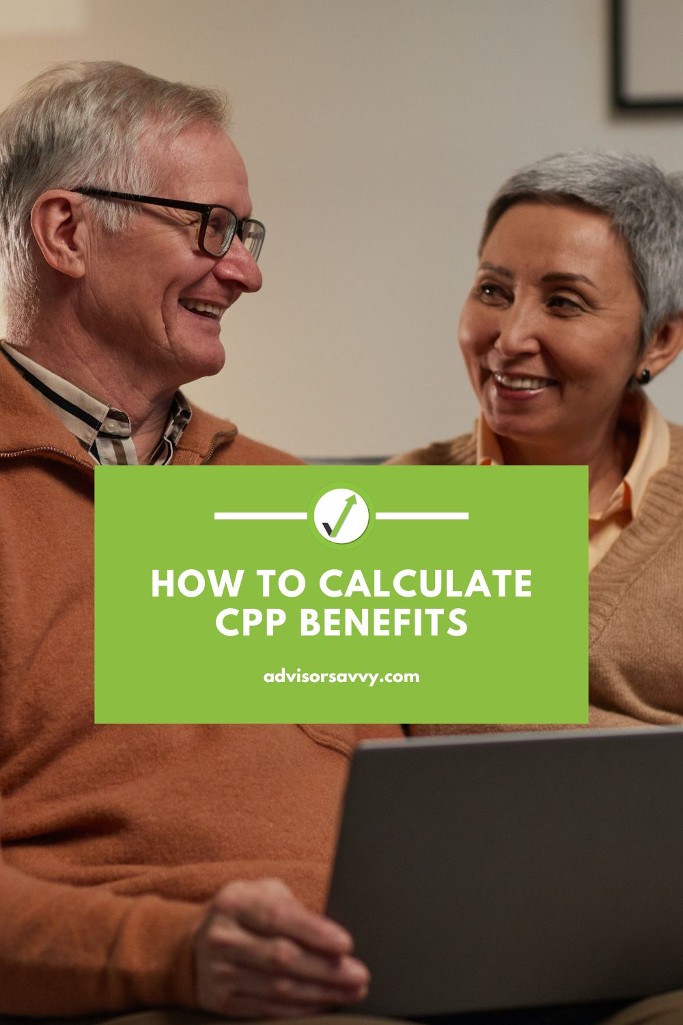
If you’re approaching retirement, or planning in advance of your retirement, you might be wondering how to calculate CPP payments. Afterall, many Canadians rely on the Canada Pension Plan for income when they retire. The amount you receive depends on various factors, such as how much you’ve earned in your life and how much you paid into CPP. To learn more about how to calculate CPP benefits, continue reading below.

Table of contents
What is the Canada Pension Plan (CPP)?
The Canada Pension Plan (CPP) is a retirement pension offered by the Canadian government. It is a monthly, taxable benefit that replaces part of your income upon retirement. If you qualify for CPP, you’ll receive the benefit for the remainder of your life. To calculate CPP, the government evaluates your career in Canada. The Canada Pension Plan Act was enacted in April 1965. The CPP program has been benefiting Canadians ever since.
How about the Quebec Pension Plan (QPP)?
The Quebec Pension Plan (QPP) is a public insurance plan. It provides people who work or have worked in Quebec and their families with basic financial protection in the event of disability, retirement or death.
As the name implies, QPP is only available to residents of Quebec. The QPP is financed by contributions from Quebec workers and employers. These contributions are collected by the Agence du Revenu du Quebec (ARQ). The plan has three kinds of benefits: retirement pension, disability benefits and survivors’ benefits.
Unfortunately, it is more challenging to estimate QPP benefits because of the way the program is designed. Reach out to a specialist at the ARQ to learn more.

Match to your perfect advisor now.
Getting started is easy, fast and free.
How does CPP work?
The Canada Pension Plan is based on your career and working life. As an employed individual, you are paying into CPP with every pay cheque you earn. Your employer is responsible for calculating CPP. Normally, you can see this breakdown on your pay statement. As for business owners and self-employed individuals, the same is not always true. You can elect to pay into CPP each year on your tax return, if you wish.
Alternatively, you can take a salary from your business where CPP will be remitted. These contributions throughout your career determine how much you get from the plan. When you retire or reach age 60, whichever comes sooner, you can begin to claim CPP payments.
How to apply for CPP
CPP payments are not automatic. For this reason, you must submit a Canada Pension Plan application. To qualify for CPP payment, you must:
- Be at least 60 years of age
- Made at least one valid contribution to the Canada Pension Plan
When should I apply?
It is best if you apply in advance of when you’d like to start receiving CPP payments. Most people know when they are set to retire. Therefore, you should apply well in advance of that date to ensure you start receiving your payments right at retirement.
The standard age to begin receiving CPP payments is 65. However, you can start receiving your payments as early as 60 or as late as age 70. If you go on the plan earlier, your payment will be smaller. But if you go on the plan later, your payment will be larger.
Calculate CPP benefit amounts
How is my CPP calculated? How much CPP will I get? These are all great questions! Calculating your CPP benefits can be complex because there are a lot of moving parts. Your situation and circumstances determine how much you’ll receive exactly. Learn more on how to calculate CPP below.
How much CPP will I get at 60?
Unfortunately, calculating CPP isn’t a one size fits all formula. The amount of your monthly CPP payment is based on your average earnings throughout your working life, your contributions to CPP, and the age you decide to start your CPP retirement pension. Contributions to CPP made throughout your life are based on your earnings. For this reason, you can come up with a CPP estimate, but the actual amount will be determined when you enroll.
By this logic, the more you earn in your life, the more you will receive from CPP. However, this is mainly true for employed individuals who pay into CPP with every pay cheque. For individuals who own a business or are self-employed, they may not be paying into CPP consistently throughout their life. It all depends on the individual when creating an estimate of CPP benefits.
Is it better to take CPP at 60 or 65?
How much CPP will I get at 60 versus later? The longer you wait to go on CPP, the larger your payment will be. For this reason, it is better for you to take CPP at age 65 because your monthly payment will be larger. Use the Canada pension calculator below to determine estimated monthly CPP benefits at different ages.
Situations that affect your CPP calculation
Your CPP payment may fluctuate up or down if one or more of the following scenarios applies in your lifetime:
- You are working while receiving CPP. In this case, you’ll qualify for a CPP post-retirement benefit. You will receive additional money which will be paid to you for the remainder of your life. This can increase your benefit amount.
- Contributions after age 65. If you work after age 65 and have not yet started to receive your CPP retirement pension, your earnings will replace any periods of low earnings before age 65, if it would be to your advantage. Contributions to CPP stop when you reach age 70 even if you’re still working. This can increase your benefit amount.
- Periods of low or no salary. When you have a low to no salary, you are not making contributions into CPP. The CRA automatically excludes up to 8 years of your history with the lowest earnings when calculating the base component of your CPP retirement pension. Having low to no salary for a period of time affects your CPP negatively, but the 8 year omission increases the payment amount.
- Periods of raising children. If you went through periods of caring for children under the age of 7, this provision can increase your CPP benefit.
- Periods of disability. Periods where you received a CPP disability payment will not be included in the calculation of the base component of the benefit. This will increase your CPP retirement pension.
- Pension sharing. You can share your pension with your spouse or common-law partner. Pension sharing can lower taxes in retirement by decreasing your taxable income.
- Divorce or separation. Credit splitting allows your CPP contributions to divide equally between you and your spouse/common-law partner if you separate or divorce.
Tools to Calculate CPP
Here is the Canada CPP Benefit Calculator. Use this tool to calculate CPP you’ll receive monthly. You can also use this retirement savings calculator to help you plan.
Is CPP taxable income?
Yes, CPP is taxable income. You must report it on your income tax return every year. Every year that you receive CPP, you will get a T4A(P) from the Canada Revenue Agency. Use this slip to report pension income on your tax return.
What is the average CPP payment in 2022?
For 2022, the maximum monthly CPP amount you can receive as a new recipient starting the pension at age 65 is $1,253.59. The average CPP payment to recipients as of January 2022 is $779.32 per month.
CPP payment dates 2022
For the remainder of 2022, CPP dates for payments are as follows:
- July 27, 2022
- August 29, 2022
- September 27, 2022
- October 27, 2022
- November 28, 2022
- December 21, 2022
Final Thoughts
CPP in Canada is a great benefit to retirees. The amount of CPP fluctuates based on the individual in question. However, it’s understandable that you would want to estimate the amount before retiring. In addition, you may want to know what the amount will be before making certain decisions, such as what age to retire or when to apply for the program. Use the Canada Pension Plan Calculator to make an estimate. Remember, the maximum CPP benefit in 2022 is $1,253.59. Happy retirement planning!

